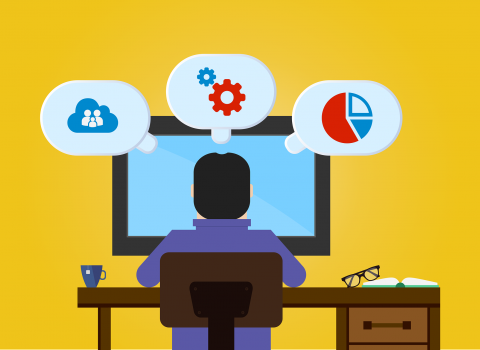07.06.23 update
It was announced Drupal 7 support would be extended until January 2025. This may be a longer period of time but it will still need attention. This is due to the larger upgrade required to move D7 to the current D10 version. It’s also worth mentioning D7 will receive reduced security fixes and support from 01.08.23 onwards so our recommendation to upgrade remains the same.
Who needs to upgrade?
If you’re running Drupal CMS, you are almost certainly on one of the versions between 7 and 10.
Chances are you’ve heard a lot about Drupal 7 end of life (EOL) recently and, for that matter, Drupal 9 EOL. This is because D7 and D9 are by far the two most common versions in use in the UK today.
So what exactly does EOL mean for you and do you need to upgrade in 2023?
Tackling the last question first, the answer is probably, and for information on upgrading, read on to find out more.
If you are running Drupal 7 then, yes, you need to upgrade your Drupal instance soon. If your content management system (CMS) is in Drupal 8 then, yes, you need to act urgently without delay. If you’re on Drupal 9 then, yes, also soon.
However, if you’re running Drupal 10, then no, sit back and relax – you are already on the most future-proof, secure and featured version available.
What is Drupal 7 end of life?
Most organisations currently contemplating an upgrade will either be on Drupal 7 or Drupal 9.
Drupal 7 end of life is currently scheduled for November 2023, also currently the same date for Drupal 9 EOL. End of life means community support for security and bug fixes will end for Drupal core and its contributed modules on that date. This will result in a dormant open-source code base, increasingly at risk from targeted attacks and malicious activity. Don’t delay as the consequences can be severe – make sure you review your set up now and start preparing a plan of action.
Most organisations currently contemplating an upgrade will either be on Drupal 7 or Drupal 9.
Why upgrade to Drupal 10?
Drupal 10 is the latest version of the Drupal CMS. It was officially released on 15 December 2022 and is built on the most up-to-date version of the Symfony application framework (6.2) and PHP (8.1).
It includes an enhanced user experience and intuitive CMS that delivers a faster, more optimised website experience. It offers new streamlined ways to manage front-end development and site-building along with a wider range of contributed extensions available from launch.
Running Drupal 10 also ensures your website is up-to-date with the latest security patches and bug fixes within Drupal core and its contributed modules.
What’s the upgrade path to D10 like?
The upgrade path from Drupal 8 or 9 to Drupal 10 is smooth and straightforward as these versions are all dependent on Symfony.
Drupal 7 can also be upgraded directly to Drupal 10 although the process is more involved – as it is to move from Drupal 7 to versions 8 or 9 – and needs to be handled by an experienced web developer. More on this below.
Five reasons to upgrade your CMS to Drupal 10
- Ensure your CMS is securely maintained
- Drupal 7 end of life and Drupal 9 EOL will leave your current platform unsupported
- Slicker end product and better responsive performance on mobile devices
- Content is easier to manage
- Better accessibility for users
Are there any reasons not to upgrade to Drupal 10?
Drupal 10 benefits from the latest version of Symfony and PHP. If you have other systems or applications that integrate with Drupal, and which are running anything earlier than Symfony 6 or PHP 8.0.2, then this needs to be considered as part of the same upgrade project.
Why is it more work to migrate from Drupal 7 to Drupal 10?
Drupal 7’s architecture is very different to Drupal 10 and it’s a medium sized project to carry out the migration. This is because Drupal 10 is built on top of the open source Symfony platform and uses the twig templating engine, whereas Drupal 7 uses an older PHP templating engine. The upgrade process involves a full website rebuild and content migration.
Happily, once you have migrated to Drupal 10 future upgrades should be much simpler.
If Drupal 7 end of life is here, what about Drupal 8?
Drupal 8 actually reached EOL in November 2021 – before Drupal 7 end of life this year! The primary reason for this was its dependency on the Symfony platform and, specifically, Symfony version 3, which also reached EOL in November 2021. In Drupal 10 that dependency was updated to Symfony 6.
If you have a website running on Drupal 8 then it is important to upgrade your site to Drupal 10 straight away as it may no longer be secure. Fortunately, the migration process is straightforward from Drupal 8 to Drupal 10.
When should I start preparing to upgrade Drupal?
In a word: now.
Drupal 10 is secure, efficient, fast and more future-proof than any previous version of Drupal.
If you’re on Drupal 8 or 9, there is a clear and simple upgrade path towards the latest platform.
Due to the possible time involved in upgrading your Drupal 7 site to Drupal 10, organisations running this version should definitely be thinking about the upgrade now in advance of the November 2023 Drupal 7 end of life.
At OWA we are a group of highly experienced Drupal developers who have run a number of Drupal 7, 8 and 9 migrations. We understand the processes and know exactly what’s involved so if you’re looking to migrate your site get in touch as we are here to help.


